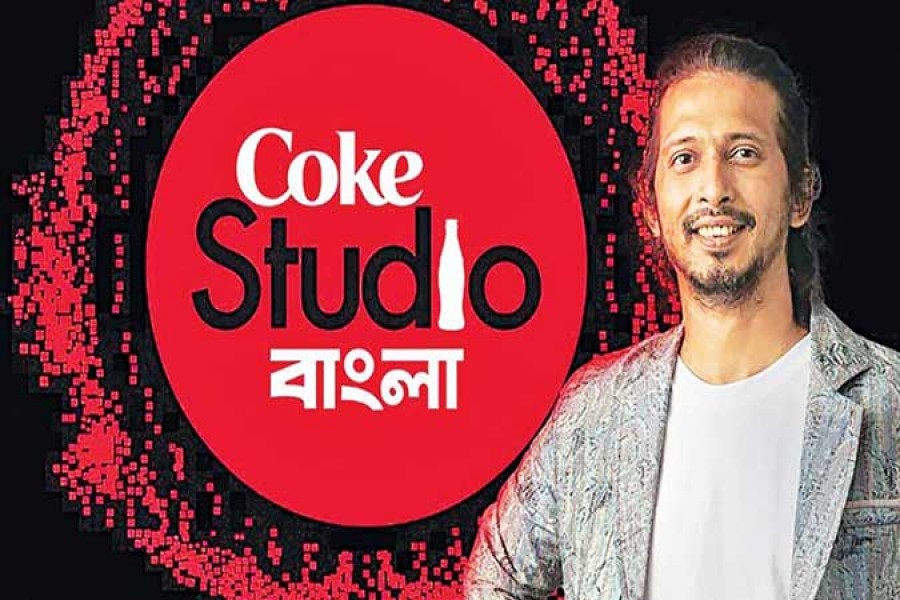
Published :
Updated :

When Coke Studio Bangla was announced earlier this year, the expectations and optimism were sky-rocketing. And as the inaugural season has come to an end, Coke Studio Bangla has left the audience with a mixed feeling of exhilaration and a craving for more seasons.
Coke Studio began its journey in Pakistan in 2008, and it expanded its operations in India in 2011 and the Middle East in 2012. The series was launched on February 7, 2022, aiming to bridge the global sound to native treasures to showcase how tradition and modernity beautifully share common ground.
Coke Studio Bangla is produced by the famed artist Shayan Chowdhury Arnob, who has left his artistic prowess in his works and made the season a success.
At the launching ceremony, he said, “Coke Studio is the embodiment of cultural fusion and a soothing mixture of diverse melodies. And being able to join the platform as a music producer is a matter of great pride for me."
There have been a number of issues raised regarding the series right after its announcement. One very prominent issue has been the issue of fusion music.
For folk singers and musical pundits, creating fusion songs essentially ruins the original tune and flavour, therefore meddling with the cultural appreciation of folk songs. It also affects the original folk singers, who still sing with traditional instruments and tunes, financially.
However, the youth love fusion music, and this revives the popularity and longevity of folk songs—many folk songs get a second life after rendition.
Another issue, a more pressing one, was the naming of the series as ‘Coke Studio Bangla’ as there were concerns about the series neglecting the songs and culture of various indigenous ethnic groups living inside Bangladesh.
However, it was later clarified that attaching Bangla with the name was done to reach all four hundred million Bengalis living worldwide, and there would be representations of various indigenous ethnic groups.
The theme song ‘Ekta Cholo Re’ was released on February 7, and it was an instant hit. And the first song ‘Nasek Nasek’ performed by Animesh Roy and Pantho Kanai, silenced much of the criticism. It was a Hajong song that kick-started the series, debunking the concerns about the series neglecting the indigenous people of the country.
However, the second song, 'Prarthona' fell flat in the sand, mostly due to the long break taken before releasing it. The song, sung by Momtaz and Mizan Rahman, was a mishmash, where a folk legend such as Momtaz lost her way, the song only to be salvaged by Mizan.
These two songs actually show the summary of the series—sometimes the series was creating waves with wonderful music, and sometimes the songs failed to live up to the expectations.
There have been songs like ‘Bulbuli’ by Rituraj Baidya and Nandita, ‘Shob Loke Koy’ by Kaniz Khandkar Mitu and Soumyadeep Murshidabadi that resonated with the audience; songs like ‘Chiltey Rod’ by Arnob and Boga Taleb that made everyone cry; and songs like ‘Bhober Pagol’ or ‘Lilabali’ that have not lived up to the expectations.
However, Coke Studio Bangla has tried its best to present a wholesome series, and the result has been mostly positive. What Coke Studio has had no shortage of is publicity. It was the trending topic for months, and it also created waves in the social media, with netizens judging and talking about the songs all the time. This is a great sign for the series.
However, the biggest controversy surrounding the series was the live concert. The concert was a heap of mismanagement and negligence, from being postponed a number of times due to torrential rain to questionable arrangements for bands who had suffered huge losses as rain water ruined their instruments.
The Arekta Rock Band, a youth band from Dhaka, was not allowed to perform even though they had been on the list throughout the day. This left the music fans disheartened.
Overall, Coke Studio Bangla has been a unique series, and there were a lot of boxes to tick for Arnob and the company. Coke Studio Bangla could have become a better series had it not been subjected to such scrutiny and political correctness.
Despite all that, the series has been a fresh breeze in the stuck Bangladeshi music industry, and it should continue to progress in the years to come.
shadique.mahbub.islam@gmail.com


 For all latest news, follow The Financial Express Google News channel.
For all latest news, follow The Financial Express Google News channel.